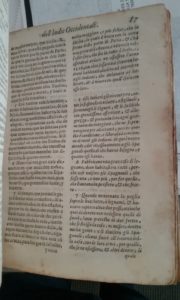It may seem like Spanish empire in the Americas would have little to do with European politics, but we should not assume that the Atlantic world of the sixteenth and seventeenth centuries was any less global than our own. As noted in a previous post, the publication in Europe of different editions of Bartolomé de Las Casas's description of Spanish colonialism was linked to both conflict with Spain and sovereignty and border politics a long way from Mexico.
Another new arrival to Special Collections' Las Casas collection is a perfect example of these European concerns. It is a Venetian edition of the text, printed in 1626. While we may think of Venice as being a long way from the problems of the people of Mexico, it was in frequent conflict with Spain; so books like this would have been popular. Due to a variety of circumstances, largely based on inheritance, the Spanish crown in the seventeenth century also controlled considerable territory in Italy, as well as in the Low Countries and in what is now eastern France. Venice and Spain were therefore rivals for influence in and control of the Italian peninsula. In this case the printer took the unusual step of making a dual-text edition. The new acquisition is printed in two columns, one in Spanish and one in Italian. So although this was acquired by the library to be used in Hispanic Studies and History classes, if there is anyone who understands one of those languages and wants to learn the other while reading descriptions of Spanish imperial activities in Mexico, we now have the perfect resource.

Other boundary disputes were less about power than money. Many of us are familiar with pirated DVDs made outside the country of origin so as to avoid copyright, but what about books? Two of the editions of Las Casas in Special Collections illustrate just how this happened in the late seventeenth century. A French translation was published in Paris in 1697, dedicated to the Comte de Toulouse, illegitimate son of Louis XIV. It received the 'Privilege du Roi,' a form of copyright that prevented anyone else in France from printing this book for ten years. However, French rules about who could print a book did not apply outside France, and the Dutch Republic, a short voyage away across the Spanish Netherlands, was known for copying French books. Which is why we also have a copy of the same book, right down to the dedication to Toulouse, printed in Amsterdam in 1698. Publication was profitable, and French was spoken throughout Europe. If someone else had done all the work of translation, all the Amsterdam printer had to do was buy a copy of the original and pay his compositor to replicate it and his pressmen to print it. In a globalising world that still had national boundaries, even books were worth pirating, and one as popular as Las Casas, absolument.


